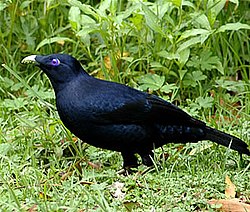Bowerbirds
| Bowerbirds | |
|---|---|
 |
|
| Male satin bowerbird Ptilonorhynchus violaceus |
|
| Scientific classification | |
| Kingdom: | Animalia |
| Phylum: | Chordata |
| Class: | Aves |
| Order: | Passeriformes |
| Suborder: | Passeri |
| Family: |
Ptilonorhynchidae GR Gray, 1841 |
| Genera | |
|
Ailuroedus |
|
Ailuroedus
Amblyornis
Archboldia
Chlamydera
Prionodura
Ptilonorhynchus
Scenopooetes
Sericulus
Bowerbirds /ˈbaʊərbɜːrd/ make up the bird family Ptilonorhynchidae. They are renowned for their unique courtship behaviour, where males build a structure and decorate it with sticks and brightly coloured objects in an attempt to attract a mate.
The family has 20 species in eight genera. These are medium to large-sized passerines, ranging from the golden bowerbird at 22 centimetres (8.7 in) and 70 grams (2.5 oz) to the great bowerbird at 40 centimetres (16 in) and 230 grams (8.1 oz). Their diet consists mainly of fruit but may also include insects (especially for nestlings), flowers, nectar and leaves in some species. The satin and spotted bowerbirds are sometimes considered agricultural pests due to their habit of feeding on introduced fruit and vegetable crops and have occasionally been killed by affected orchardists.
The bowerbirds have an Austro-Papuan distribution, with ten species endemic to New Guinea, eight endemic to Australia, and two found in both. Although their distribution is centered on the tropical regions of New Guinea and northern Australia, some species extend into central, western, and southeastern Australia. They occupy a range of different habitats, including rainforest, eucalyptus and acacia forest, and shrublands.
...
Wikipedia
